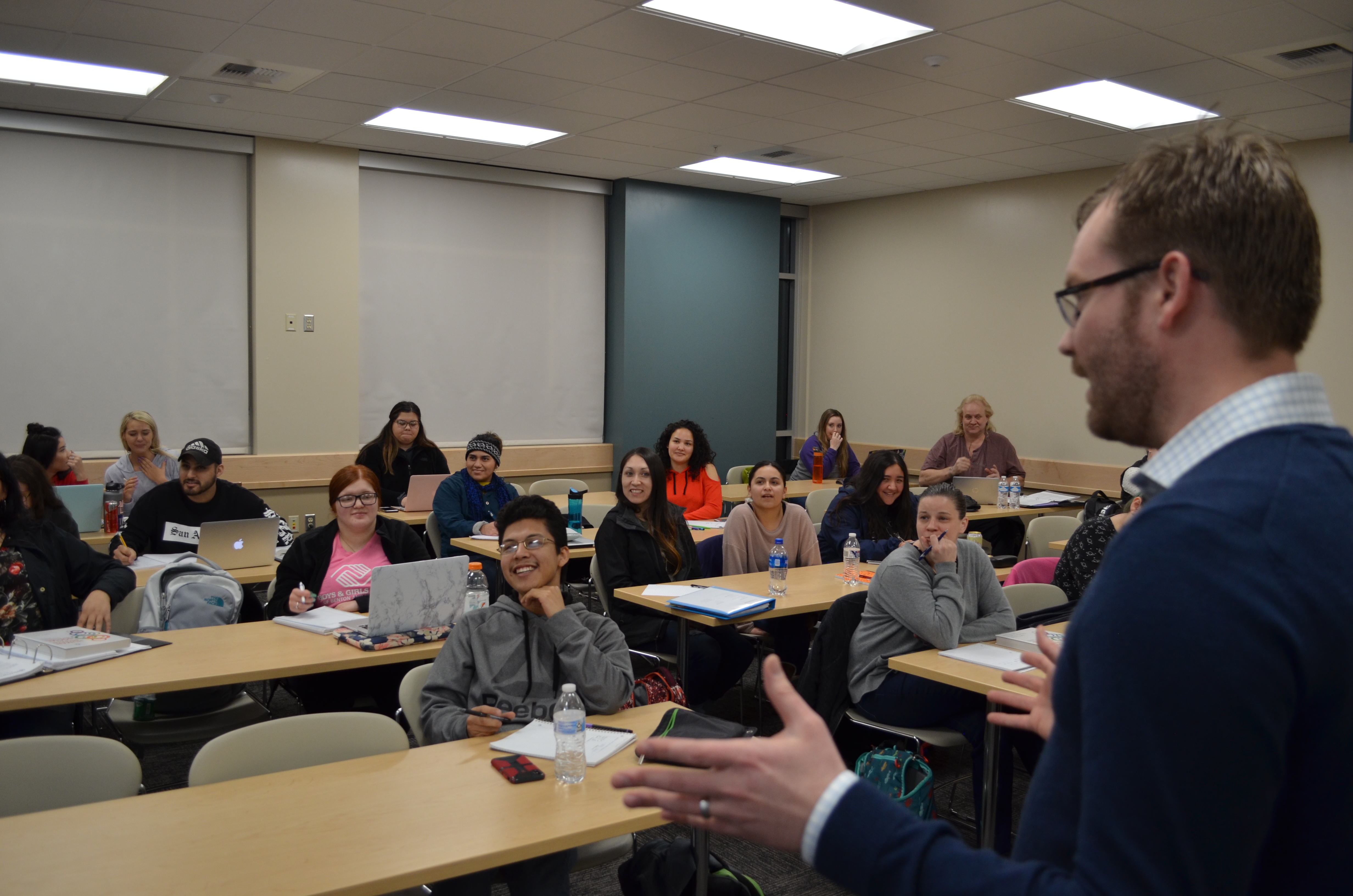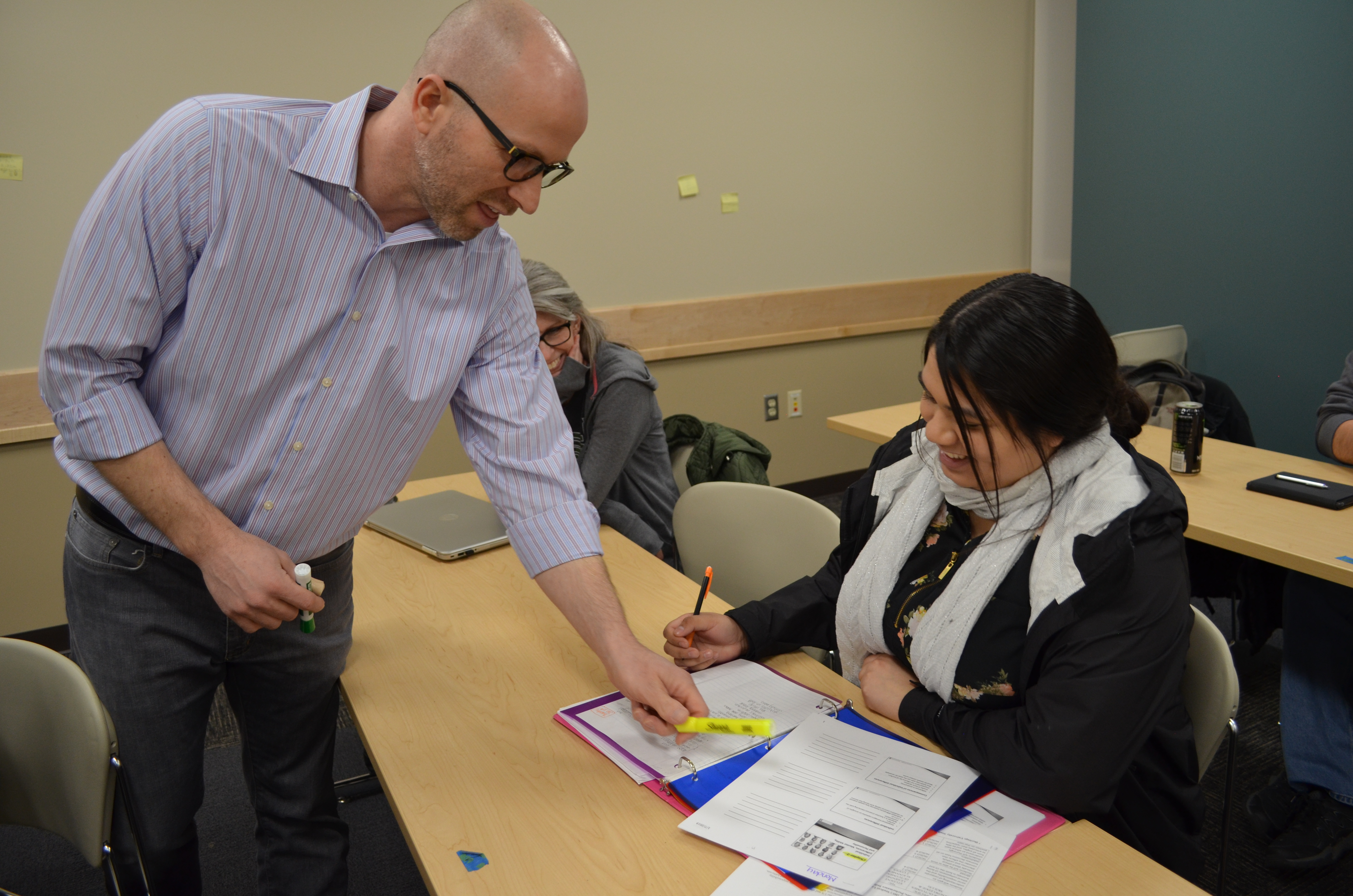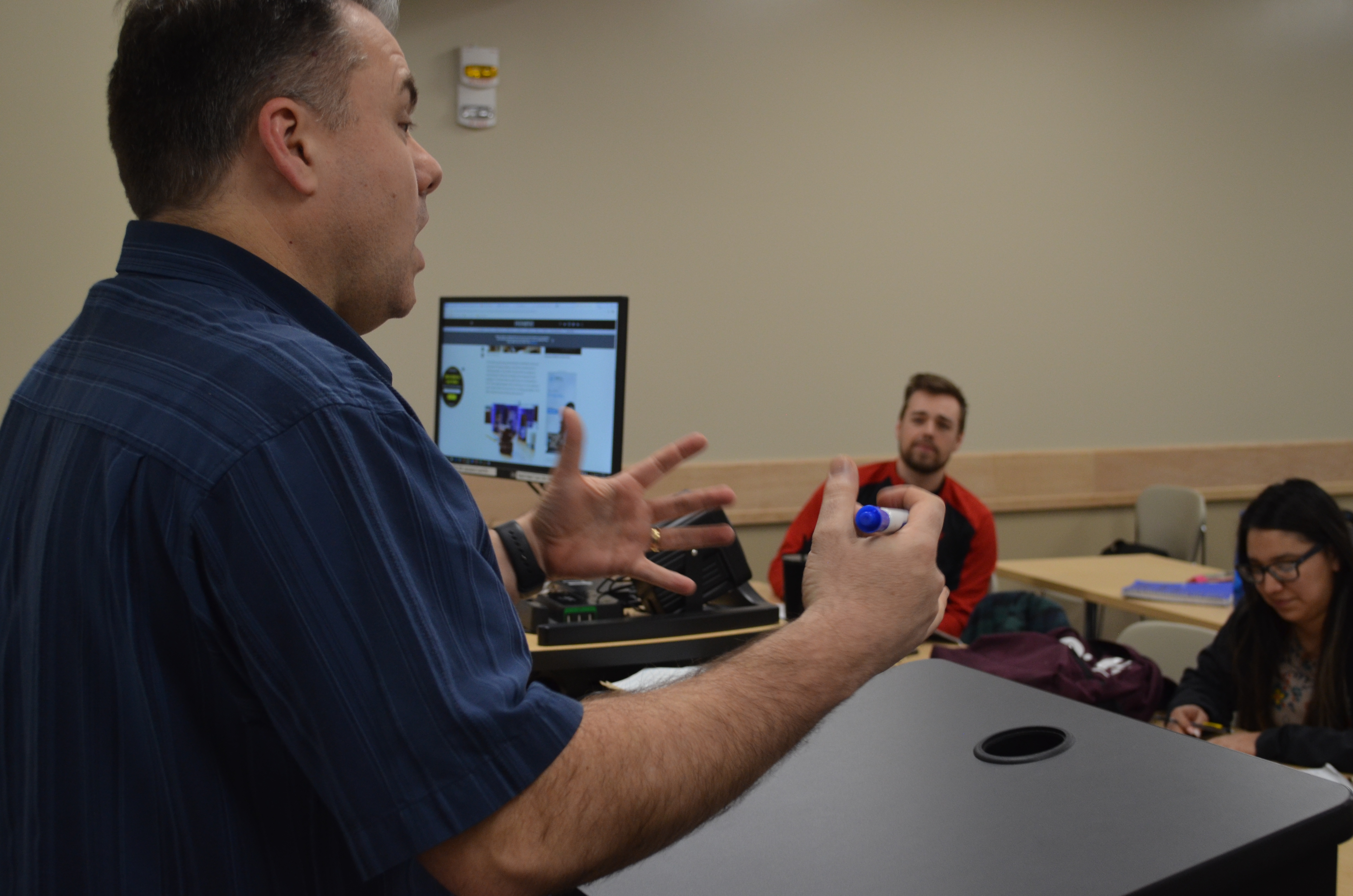15 Years of Heritage + CBC
Senior and education major Christy Jo Taylor dreamed of becoming a teacher since she was a little girl. She’s committed to that goal.
Every day, she drives an hour each way from her home in rural Othello, Washington to attend her Heritage classes on the Columbia Basin College (CBC) campus in Pasco. Four years ago, when she first started her academic journey, she had no idea how she was going to complete her studies after she earned her associate degree. The nearest university was more than 200 miles away, which meant she would either have to move or spend four hours a day on the road. Still, she took that first step and enrolled at CBC. It was there that Taylor learned about a partnership between the community college and Heritage that meant that Adjunct professor Alex Nelson with his Human Behavior in the Social Environment class she could continue her education right there, on the campus she knew so well.
“I saw a sign for Heritage, and I went over to the office to see what degrees they offered,” said Taylor. “I was surprised to see they had an education program, and I was thankful I didn’t have to travel to WSU, which is so far.”
Heritage University and CBC are celebrating 15 years of working together to provide access to higher education to students in central Washington. It’s a partnership that has led to hundreds of students like Taylor following their dreams and building careers in social work, teaching, criminal justice, psychology and accounting. At Heritage University on the Tri-Cities campus, students can earn bachelor’s or master’s degrees in their desired fields. In short, this successful partnership between CBC and Heritage has strengthened both schools – by bringing more degree options to students in the Tri-Cities.
PARTNERSHIP FORGED THROUGH THE DEDICATION OF SISTERS AT FORT WRIGHT COLLEGE
Heritage’s commitment to providing access to bachelor’s and master’s degrees to communities far from its Toppenish campus goes back to before the university was formed. It started with its predecessor institution, Fort Wright College, which was operated by the Sisters of the Holy Names of Jesus and Mary.
The university’s founding president, Sr. Kathleen Ross, was then the provost of Fort Wright. She and her fellow sisters discovered that students from Omak, Washington, a rural community nearly three hours away, were driving to Spokane to study to become teachers. The need for teachers was high in the community, but there were no local options for higher education. The college opened up a small, regional degree program where students could earn their education degree in their hometown. They operated a similar program in Toppenish. When Fort Wright closed, Heritage was formed. Ross took on the presidency of the new institution. Heritage started in Toppenish and kept the satellite campus in Omak. It was the start of a core commitment that ultimately led to the Heritage and CBC partnership.
PARTNER WITH THE SAME GOAL – BRING EDUCATION TO THE UNDERSERVED
Over the years, as the university grew and deepened its roots in the Yakima Valley, then president of CBC, Rich Cummins, noticed that much of what the university was accomplishing— providing access to higher education to underserved communities—was precisely what CBC was doing. However, he noticed that many of his CBC graduates didn’t continue into bachelor’s degree programs, even though they were well prepared and had all of the prerequisites.
“When you are a community college, you see there are just some in your population who won’t transfer because they are place-bound. So we tried to figure out different options for degree completion,” he said.
Cummins and the Vice President of Administration at the time, Bill Saraceno, approached Heritage with an innovative offer: CBC would provide space to Heritage to establish a satellite location on their campus and in
exchange, Heritage would grant scholarships to CBC employees to those who wanted to enroll at the university. This trade-off was made necessary because CBC was a public college and couldn’t offer taxpayer resources free of charge. And Heritage, as a private college, simply couldn’t afford to open a new location. This creative plan benefited both institutions and was given the green light by the state.
“Whenever you start a business endeavor like expanding into a new community, you need entrepreneurial capital,” explained Cummins. “CBC was able to solve that. Heritage didn’t have to build or rent a building, and the staff ROI was instant because there was immediate enrollment. For our part, as a public institution, our buildings largely go unused in the evenings, so we had an interest in making sure they were well-used and filled with students who could become successful with our help. It’s a pretty darn good model!”
STUDENTS SUPPORTED IN TRANSITION TO HU CLASSES
Today, the relationship between CBC and Heritage has flourished and grown with 152 students enrolled on the Heritage Tri-Cities campus. Social work and education majors have usually been the most popular, with more than 50 students enrolled in each program this year. As workforce needs evolve and students express a desire for other majors, however, other degrees have gained traction, like criminal justice, which welcomed its largest cohort of 10 students last fall, and accounting which currently has 20 students.
“Heritage provides programs and classes that are in high demand for students at CBC,” said Dr. Marisol Rodríguez-Price, the regional director of Heritage University at the Tri-Cities campus. “We complement their programs. Our vision is to have a strong presence here so students can transition to Heritage seamlessly. We respect each other as institutions, collaborating, but also operating as independent partners.”
With offices right in CBC’s Thornton Center, students can walk over anytime and find a Heritage staff member. Heritage staff does not wait for the students to find them, however. They go to their classrooms every night, and for the first hour of class, they answer questions, give advice and offer support. That is how Nichole Ramirez, a senior in elementary education, discovered Heritage.
“Someone from Heritage came and talked to our class while I was a CBC student,” she remembered. “I had no idea that Heritage had a campus there. I set up a meeting with them, and they made the transition super easy.”
Before that, Ramirez thought she would have to transfer to a larger school, which was difficult since she worked full time and already drove 45 minutes to CBC, or take online classes.
“I don’t think I would have done very well with online classes,” she admitted. “I like the fact that we are together in-person. I have been in a cohort of 16 students, the same ones the whole time, and we have helped each other. I also know that if I have questions, I can ask my professor and get an answer right away, which doesn’t happen in online class.”
SHARED MISSION STRENGTHENS BOTH INSTITUTIONS
Vice president of student administration at CBC, Tyrone Brooks, explains that there is synergy between the two institutions because they share the same goals and understand the unique needs of their students.
“Our missions are similar, so the way we serve students is similar too,” said Brooks. “The main niche we occupy is serving first-generation and historically underserved students. We both understand the added level of support they need to transition to a four-year program and to complete it successfully.”
Taylor vouches for that: “The faculty is warm and welcoming and very approachable. They give great advice and were very understanding if I was unsure about anything.”
This like-minded purpose allows both institutions to identify needs in the community and adapt the programs they deliver to students. A recent example is CBC’s introduction of a bachelor’s degree in Pre-K – 3 elementary education. So many new families are moving into the area that there is a lack of teachers for the younger grades.
“It stacks up perfectly with what we already offer in early childhood education,” Brooks confirmed. “And it helps our student graduates who want higher level credentials but are place-bound.”
Dr. Rodríguez-Price agreed, noting that when the two schools sit side-by-side at career fairs, they offer a wide variety of degrees. “We say to students, ‘Start with CBC and finish with us. It’s all here!’”



